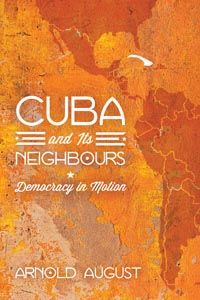Halifax Media Co-op
News from Nova Scotia's Grassroots
Book Review: Cuba and Its Neighbours - Democracy in Motion
Cuba And Its Neighbours - Democracy in Motion
Author: Arnold August
Pages: 288
Let's get this out of the way; I'm a sucker for a book that lifts the veil off of United States-style democracy and gets right to the rotten, putrid core of the thing. So it was with some excitement and predisposition that I delved into Arnold August's new book, Cuba and its Neighbours - Democracy in Motion.
Channelling a Zinn-ian approach to the subject, August rips a new hole in the tattered fabric of American democratic ideology by taking the reader on the necessary historical journey back to the rancid roots of the thing. It's a trip that's been taken before, to be sure, but August spins it nicely by focusing on voter turnout and the lack thereof over the years. There's never been an incredible amount of interest in the democratic project at home, goes the reasoning, so why export this imaginary two-party system all around the world claiming this is the pinnacle of governance models?
Why indeed.
August takes us right into the present moment, giving a nod to the Occupy movement and Obama's misguided drone policy. Barak is revealed as nothing but a new face on a system that thrives on individual opportunism, and I definitely appreciated August's dissection of Obama's speech-making as giving off all the right, if slightly coded, messages to the real global power masters.
The author then turns his eagle eye to alternative models of democracy, namely Ecuador, Venezuela and Bolivia. He holds these up as lofty examples of democracy that involve far more community and individual involvement than the media-saturated, dirty money example of our Yankee neighbours. One gets the impression that United States democratic involvement is just downright lazy when compared to August's South American examples.
Voting once every four years? Amigo, that's just the beginning.
Unfortunately for me, I found myself unable to completely engage with part three of the book, where August undertakes what must rank among the most in-depth analysis ever done on the Cuban democratic model. There's nothing wrong with the writing, and scholars on the subject will surely revel in this section, but I suffer from the short attention span that unfortunately seems to afflict so many of my generation.
Bureaucrats and policy makers with a bent towards making the world a more Cuban place will find the blueprints contained within August's book. For myself, I couldn't muster the interest to know the precise voter turnout in various polling stations across the island, or the breakdown between slate votes and selective votes, and whether this truly suggested voter dissatisfaction or not. This is definitely key information for some; just not for me.
August loves his Cuba. My only complaint is that I couldn't quite share in his adoration as it was exhaustively laid bare in a style I didn't find quite poetic enough for my literary tastes. If you'd like to foment a revolution and then learn exactly how to mirror the Cuban democratic model - and potentially navigate around the potholes it has admittedly experienced - then buy this book.
Viva la revolucion!
The site for the Halifax local of The Media Co-op has been archived and will no longer be updated. Please visit the main Media Co-op website to learn more about the organization.



